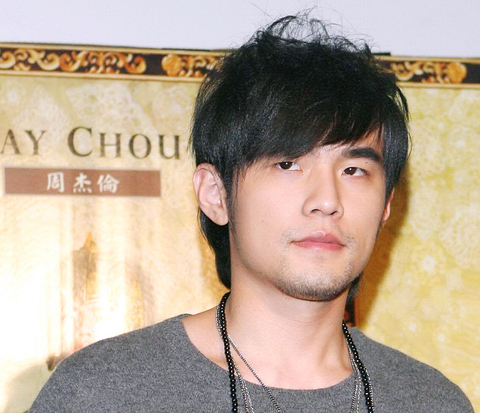The ongoing brawl between Jay Chou (周杰倫) and his former record company, Alfa Music (阿爾發), over the copyright to the Mando-pop king's catalog, turned into open warfare last week when the record label confirmed it had applied to have a portion of Chou's property, some NT$50 million worth, seized by authorities. The company claims it owns the copyright to many of Chou's popular songs.
Not a scaredy-cat to be messed with, Chou and his JVR Music (杰威爾音樂) allies counter-attacked and assured Chou's fans the greedy, evil music empire won't get its mitts on his moola since the self-proclaimed music genius claims sole ownership of all his songs.
Compared to the legal quarrel, Chou's mere three nominations for this years' Golden Melody Awards (金曲獎) seem to agitate the Chairman still more, leading to his decision to withdraw from the award ceremony on June 16 as a form of protest against the jury's "dilettante" taste.

PHOTO: TAIPEI TIMES
Interviewed by Chinese media last week, the pop idol made no effort to hide his loathing for the Golden Melody and said he didn't have time for the event anyway since he would be a guest at the Shanghai International Film Festival.
"Can you believe what I am nominated for? The best single producer! It's like saying I am only good for making one song. Well, I will no longer trouble myself with the award since it is just one big game," Chou was quoted as saying.
Another sore loser who lost her title of Killer of Teenage Boys (少男殺手) to Jolin Tsai (蔡依林) a few years ago is former pop idol Yuki Hsu (徐懷鈺), who has returned to the spotlight after a five-year hiatus, decked out in a cheap black-leathered temptress look, clearly catering to her older male fans.

PHOTO: PROVIDED BY SKY HIGH ENTERTAINMENT
As the old saying goes "a gentleman can wait three years to take his revenge" (君子報仇,三年不晚), and Yuki successfully made the gossip headlines with insinuations her old foe is just a copycat of Japan's pop diva Ayumi Hamasaki, appropriating her look, dance steps, music video and crystal nails.
Whether or not the copycat accusation will stick remains highly questionable, but a catfight is clearly brewing.
Cannes is basking in the annual global spotlight, filled as it is with celebrities and megastars this month. Not to be left out, celebrity shows starring high-society dames have become all the rage in Taipei, imitating Hong Kong's fashion-party culture, which has been nurtured by Next Magazine (壹週刊). It is now bringing out a new generation of a well-bred, spotlight-hogging celebrities made up of wealthy, influential and beautiful young women.
Currently under the leadership of actress Terri Kwan (關穎), daughter of chairman of the Jih Sun Group (日盛集團) and Amy Sun (孫芸芸), daughter of Jack Sun (孫道存), the former chairman of Pacific Electric Wire and Cable, the gang never fail to make the weekly fashion headlines, and reports detail the price of their Cartier diamond watches and Hermes bags sported at weekend parties and fashion shows.
Having both looks and academic qualifications from celebrated universities are indispensable for membership of this exclusive club, and these high-society belles serve as a source of prince and princess fairy tales for those less fortunate and less wealthy.

Oct. 27 to Nov. 2 Over a breakfast of soymilk and fried dough costing less than NT$400, seven officials and engineers agreed on a NT$400 million plan — unaware that it would mark the beginning of Taiwan’s semiconductor empire. It was a cold February morning in 1974. Gathered at the unassuming shop were Economics minister Sun Yun-hsuan (孫運璿), director-general of Transportation and Communications Kao Yu-shu (高玉樹), Industrial Technology Research Institute (ITRI) president Wang Chao-chen (王兆振), Telecommunications Laboratories director Kang Pao-huang (康寶煌), Executive Yuan secretary-general Fei Hua (費驊), director-general of Telecommunications Fang Hsien-chi (方賢齊) and Radio Corporation of America (RCA) Laboratories director Pan
The consensus on the Chinese Nationalist Party (KMT) chair race is that Cheng Li-wun (鄭麗文) ran a populist, ideological back-to-basics campaign and soundly defeated former Taipei mayor Hau Lung-bin (郝龍斌), the candidate backed by the big institutional players. Cheng tapped into a wave of popular enthusiasm within the KMT, while the institutional players’ get-out-the-vote abilities fell flat, suggesting their power has weakened significantly. Yet, a closer look at the race paints a more complicated picture, raising questions about some analysts’ conclusions, including my own. TURNOUT Here is a surprising statistic: Turnout was 130,678, or 39.46 percent of the 331,145 eligible party

The classic warmth of a good old-fashioned izakaya beckons you in, all cozy nooks and dark wood finishes, as tables order a third round and waiters sling tapas-sized bites and assorted — sometimes unidentifiable — skewered meats. But there’s a romantic hush about this Ximending (西門町) hotspot, with cocktails savored, plating elegant and never rushed and daters and diners lit by candlelight and chandelier. Each chair is mismatched and the assorted tables appear to be the fanciest picks from a nearby flea market. A naked sewing mannequin stands in a dimly lit corner, adorned with antique mirrors and draped foliage

The election of Cheng Li-wun (鄭麗文) as chair of the Chinese Nationalist Party (KMT) marked a triumphant return of pride in the “Chinese” in the party name. Cheng wants Taiwanese to be proud to call themselves Chinese again. The unambiguous winner was a return to the KMT ideology that formed in the early 2000s under then chairman Lien Chan (連戰) and president Ma Ying-jeou (馬英九) put into practice as far as he could, until ultimately thwarted by hundreds of thousands of protestors thronging the streets in what became known as the Sunflower movement in 2014. Cheng is an unambiguous Chinese ethnonationalist,